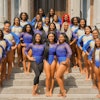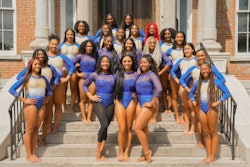A new study by a Middle Tennessee State University (MTSU) professor indicates that women’s basketball teams at historically Black colleges and universities (HBCUs) are penalized at higher rates than teams from other institution types, suggesting that long-standing assumptions of racial bias in college athletics could be true.
Although HBCU teams only accounted for 6.9 percent of the 333 institutions analyzed in the study, they were the five most penalized teams in the 10-season study period, according to Dr. Andrew Dix, assistant professor of communication at MTSU. Further, eight out of the 15 most penalized teams were HBCU teams.
Dix posits that bias, coupled with limited referee monitoring and overrepresentation of White males in the National Collegiate Athletic Association’s (NCAA) senior leadership, has resulted in a “micro-level rules structure for personal fouls that is disadvantageous for female basketball teams from HBCUs.”
 Dr. Andrew Dix
Dr. Andrew DixIn the study that was recently published in the Howard Journal of Communications, Dix identified 23 HBCU women’s basketball teams and 310 women’s basketball teams from predominantly White institutions (PWIs). He calculated each team’s 10-year average of personal fouls per game (PFPG) using NCAA Division I women’s basketball data from 2008 and 2017.
Study findings showed that, during the study period, female HBCU teams were called for a PFPG average of 18.91 by referees compared to PWIs’ PFPG average of 17.15, demonstrating referee bias, according to Dix.
Every women’s college basketball team from an HBCU held a PFPG average above the Division I average, the study found. No PWI held a PFPG average that was statistically significant at the .01 level.
“Adverse calls against HBCUs relative to PWIs in women’s college basketball offers circumstantial evidence of a larger socio-cultural issue that has hamstringed HBCUs sports teams within the field of play,” Dix said in an email to Diverse. “Fostering a dialogue on referees calling more personal fouls against HBCU women’s college basketball teams relative to PWI women’s college basketball teams is a good starting point for creating awareness that will better inform sports consumers and hopefully bring about meaningfully change on the women’s college basketball court.”
The scholar’s research has also shed light on referee bias against HBCU college football teams playing from 2006 to 2015. Dix’s prior study in the International Journal of Science Culture and Sport similarly found that the 13 most penalized teams were from HBCUs.
With this latest study on bias in collegiate women’s basketball, Dix took a Black Feminist Thought approach to his work because the theoretical framework is “designed to offer caring dialogue for those that have been marginalized and because Black Feminist Thought is designed to promote social change” – in this case, particularly around how referees officiate within the fields of play, Dix said.
Brianna Clark, a Ph.D. student in Howard University’s Higher Education Leadership and Policy Studies program and assistant volleyball coach at Trinity Washington University, said she was not surprised by Dix’s study findings.
“There have always been clear and distinct inequalities against women in college athletics, especially Black women,” Clark said. “There is a lack of protection for our Black women athletes, and that disappointing reality is further proven within this study.”
Conversations about the treatment of Black and women athletes in sports overall have been prominent this year.
In September, Lynn Redden, the superintendent of the Onalaska Independent School District in Huntsville, Texas, received swift backlash after he made comments about Houston Texans quarterback Deshaun Watson saying, “When you need precision decision-making, you can’t count on a Black quarterback.”
Following reports that she was drug-tested more than any other tennis star, Serena Williams cited discrimination as the reason other players did not receive equal testing. Moreover, Williams’ and umpire Carlos Williams’ controversial U.S. Open clash last month led some observers to argue that the tennis star’s outbursts of frustration would not result in penalties if she were male, underscoring an interconnection of gender and race.
In the context of collegiate sports, Clark said leadership and spectators must hold individuals and staff accountable for their actions against players and ensure that all student-athletes receive the treatment they deserve on and off the field or court. She also cautions against encouraging athletes of color to “manage” their expressions while competing.
“I want my players to authentically feel and have a space where they can express themselves in a healthy manner,” Clark added. “In telling athletes of color to ‘manage’ or essentially make their actions seem ‘less aggressive’ contributes to the narrative of White supremacy within college and professional sports.”
Dix’s study has wider implications for NCAA officials, institutional athletic directors and other sports stakeholders. One thing he hopes leaders takeaway from the research is the potential use of internal investigations or audits to determine why HBCU women’s college basketball teams receive the most penalty calls.
“Stakeholder[s] that I would hope have the greatest takeaway from this study would be the athletic directors of HBCU programs and the coaches of HBCU women’s college basketball teams,” Dix said. “These empowered individuals at HBCU athletic programs should know what is occurring in the field of play and now they have hard statistical data to support it.”
Tiffany Pennamon can be reached at [email protected]. You can follow her on Twitter @tiffanypennamon.



















